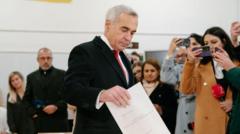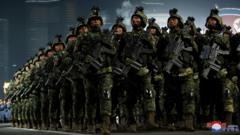Romanian political dynamics are thrown into question as the court’s decision leads to a new electoral campaign, impacting candidates and the nation’s democratic process.
**Romania's Presidential Election First Round Results Nullified Amid Accusations of Foreign Interference**

**Romania's Presidential Election First Round Results Nullified Amid Accusations of Foreign Interference**
Romania's Constitutional Court has declared the first round of the presidential election invalid, necessitating a complete do-over amid allegations of Russian influence.
The Romanian Constitutional Court has annulled the results of the first round of the presidential election, an unexpected decision just days before the scheduled second round. The ruling compels a complete reorganization of the electoral process, leaving the government tasked with setting a new date for the vote.
This first round had been claimed by Calin Georgescu, a little-known far-right candidate with NATO-skeptic views and previous endorsements of Vladimir Putin. The annulment follows the declassification of intelligence documents that suggested Georgescu may have benefitted from a coordinated foreign influence campaign aimed at skewing the election outcome.
In a media statement following the court's ruling, Georgescu characterized the verdict as an assault on democracy, labeling it a "formalized coup d'état". He indicated his intent to pursue the presidency again, though the feasibility of his candidacy remains uncertain.
Outgoing Prime Minister Marcel Ciolacu termed the court’s decision the "only correct solution," positing that the declassified documents demonstrated a clear distortion of the popular vote attributable to external interference, specifically from Russia.
Current President Klaus Iohannis affirmed he would maintain his position until a successor is elected, emphasizing Romania's stability and commitment to its pro-European stance and NATO alliance. He described the court’s ruling as crucial for national security.
The court convened to consider new evidence of foreign electoral interference, despite earlier intentions not to address such information. While electoral law traditionally mandates rescheduling elections for two Sundays post-annulment, the court has opted to restart the electoral campaign in its entirety, prolonging the process.
Previously, the court had initiated a recount of votes due to claims of social media favoritism towards Georgescu, with TikTok accused of bias. In contrast, TikTok firmly rejected these claims, stating that Georgescu's account received no preferential treatment.
Georgescu emerged as a frontrunner with roughly 23% of the votes, while his nearest competitor, Elena Lasconi of the opposition Save Romania Union, garnered 19%. Lasconi has since lambasted the court's decision as both "illegal" and "immoral", arguing that it disregards the preferences of millions of Romanian voters who expressed their choice during the initial round.
With the election landscape substantially altered, the ramifications of the court's decision on Romania's political future remain uncertain, leaving the nation in unprecedented territory.
This first round had been claimed by Calin Georgescu, a little-known far-right candidate with NATO-skeptic views and previous endorsements of Vladimir Putin. The annulment follows the declassification of intelligence documents that suggested Georgescu may have benefitted from a coordinated foreign influence campaign aimed at skewing the election outcome.
In a media statement following the court's ruling, Georgescu characterized the verdict as an assault on democracy, labeling it a "formalized coup d'état". He indicated his intent to pursue the presidency again, though the feasibility of his candidacy remains uncertain.
Outgoing Prime Minister Marcel Ciolacu termed the court’s decision the "only correct solution," positing that the declassified documents demonstrated a clear distortion of the popular vote attributable to external interference, specifically from Russia.
Current President Klaus Iohannis affirmed he would maintain his position until a successor is elected, emphasizing Romania's stability and commitment to its pro-European stance and NATO alliance. He described the court’s ruling as crucial for national security.
The court convened to consider new evidence of foreign electoral interference, despite earlier intentions not to address such information. While electoral law traditionally mandates rescheduling elections for two Sundays post-annulment, the court has opted to restart the electoral campaign in its entirety, prolonging the process.
Previously, the court had initiated a recount of votes due to claims of social media favoritism towards Georgescu, with TikTok accused of bias. In contrast, TikTok firmly rejected these claims, stating that Georgescu's account received no preferential treatment.
Georgescu emerged as a frontrunner with roughly 23% of the votes, while his nearest competitor, Elena Lasconi of the opposition Save Romania Union, garnered 19%. Lasconi has since lambasted the court's decision as both "illegal" and "immoral", arguing that it disregards the preferences of millions of Romanian voters who expressed their choice during the initial round.
With the election landscape substantially altered, the ramifications of the court's decision on Romania's political future remain uncertain, leaving the nation in unprecedented territory.





















